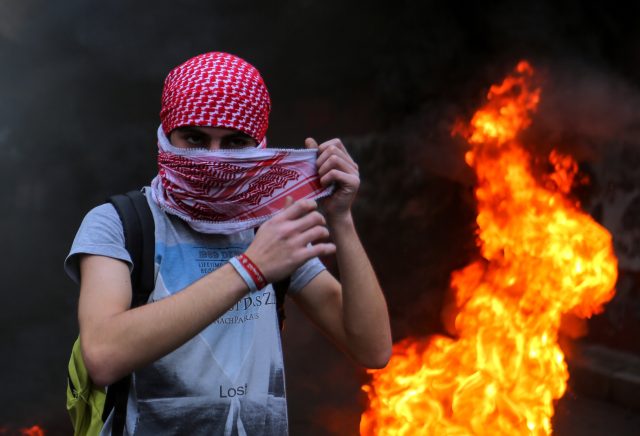
In 1991, 321 stateless Palestinians from Lebanon managed to enter Denmark and asked for asylum. Their applications were rejected by the Danish Commission on Asylum Seekers. Then, nearly 100 of them occupied a church in Copenhagen, aided and abetted by its pastor. There was a humanitarian outcry from the usual suspects, left-wing singers, actors, journalists, and some attention seekers, and from well-meaning, loquacious clergymen. Former Prime Minister and Social Democratic Leader Anker Jørgensen paid a visit to the occupied church. The popular rock singer Kim Larsen gave a concert in support of the asylum seekers. But the conservative Minister of Justice, Hans Engell, was adamant that the Palestinians should not be let in. Finally, a majority in the Danish Parliament overruled the conservative-liberal minority government. The Social Democrats, the Social Liberals, and the Socialist People’s Party passed in 1992 a special law granting the whole group asylum in Denmark. The Conservatives, the Liberals and the People’s Party voted against.
Two-Thirds of the Original Group Convicted
Now, more than thirty years have passed, so it is time to take stock. The numbers are in. Of the 321 asylum seekers 204, or almost two-thirds, have in the period 1992–2019 been convicted of some criminal offence. Of those 204, 71 have been sentenced to prison, sometimes suspended, and the rest to paying fines of more than €200; smaller fines than that are not included in the numbers. Of the 321 asylum seekers, 176 are living off government, mostly by ‘early retirement’ (122 persons, a euphemism for being unemployable). At the end of 2019, 270 in this initial group of 321 are still living in Denmark.
Hans Engell, the Minister of Justice who rejected the applications of the Palestinians, is now a journalist. In an interview with the Social Democratic online magazine Pio he says: ‘We were against the special law because such laws should only be passed in special circumstances. There was no legal ground on which this group could have been admitted to Denmark. Those who voted for the special law could however not have foreseen what would happen. They cannot be blamed. But these asylum seekers should not have been let in.’
Of course, there are individuals from this group who have worked hard and done well in Denmark. Engell himself says that recently he took a taxi and that the taxi driver thanked him profusely for having granted him asylum in Denmark. ‘I felt obliged to tell him that he did not get in by my vote. On the contrary, I fought hard against the special law.’
One-Third of the Second Generation Convicted
The whole affair was a dismal failure, as is now recognised by all major parties in Denmark, including the Social Democrats. One of the activists fighting in 1992 for the group, Fathi El-Abed, admits that the numbers are bleak, but he points out that the situation seems to be somewhat better for the 999 children from the group. Of this second generation, 337, or one-third, had in 2019 been convicted of criminal activities, and mostly been fined: 132 had been sentenced to prison, suspended or not. Again, of the 999 children, 372 were receiving government aid, but in the case of 194 of them, the aid was connected with training programmes of some kind or other. Some comfort!
The Leader of the People’s Party, Pia Kjærsgaard, tabled the questions in parliament which led to the publication of these extraordinary numbers. In an interview with Pio, she is blunter than former Minister Engell. ‘This was a huge mistake. I warned against the special law. But naive Social Democrats and Social Liberals were determined to allow those people to stay in Denmark. Now we have to put up with criminality, insecurity, and significant outlays of public money.’
A Culture of Violence?
At present, there is strong pressure in Iceland by some vocal anti-Israeli groups for letting in about 100 Palestinians from Gaza, even if they are not Icelandic citizens. The other Nordic countries have more or less confined their efforts in Gaza to their own citizens (usually of Palestinian origin). Perhaps a lesson can be learned from the 1992 affair in Denmark, obviously not because a group of different individuals could be condemned as a whole and in advance, but rather because social integration is difficult if immigrants come from a culture where violence is accepted and even applauded and where people see nothing wrong in going on welfare although they are perfectly capable of working.



 Subscribe
Subscribe